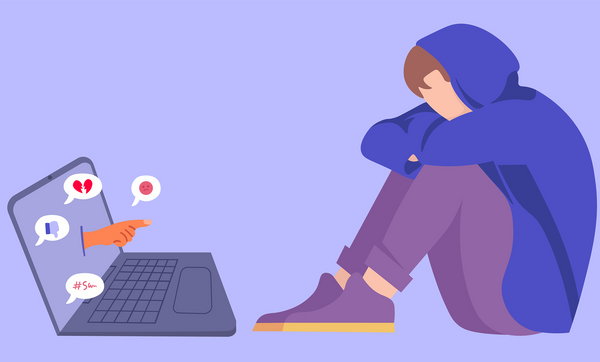Dealing with Cyberbullying as Adults and Children through Communication - School Presentation Inside

Dealing with cyberbullying might seem like an impossible task, especially given the broad array of ways it can manifest itself. The truth is that, for most incidents, there's a really useful tool that would quickly alleviate the results of cyberbullying: communication. If only adults and children would learn more about it.
Adults don't really like to deal with cyberbullying; they even sometimes minimize its effect on children. On the other side, victims don't often talk about bullying with adults, parents or teachers. The result is a blanket of silence that keeps everyone in the dark and exacerbates the effects.
It turns out that simple communication is an excellent tool that allows both children and adults to deal with cyberbullying.
Talking solves most bullying problems
Communication is the bedrock of any relationship, whether it's parent–child or teacher-student. As long as adults earn a child’s trust, communication becomes a tool to solve many bullying incidents. But at the same time, adults must know to recognize when a child goes through a difficult time in their life and doesn’t want to talk about it.
For example, children exposed to cyberbullying could withdraw from family life and activities or show signs of depression. Kids also need to know a few things that are not immediately obvious, even to adults.
In response to most cyberbullying, kids should:
• Never retaliate or respond negatively – block and report the person instead
• Take screenshots of negative behavior, threatening messages or mean comments and report them to the social media platform or police, depending on the situation
• Max out privacy settings for all social media accounts and platforms and make sure your kids' profile is set to private
The crux of the matter is that adults should remember that cyberbullying is always a threat, and they should learn to recognize when it happens. And children should be encouraged to take the correct measures when they become victims and to talk with the adults in their lives.
The more people know about the problem, the easier it will be to prevent it or deal with it when it arises. Let's use the #StopCyberbullying month to teach a new generation how to stay and feel safe online.
To help children, parents and teachers, Bitdefender put together a presentation that sheds light on all forms of bullying, primarily actions coming from the online space. It also deals with the importance of children's personal information. It’s perfect for the fifth- or sixth-grade level, and the accompanying documents allow adults to understand the information and present it to children in a comprehensive and easy-to-understand way.
Bitdefender - Internet Is Not Your Friend - School Presentation
Bitdefender - Internet Is Not Your Friend - Guide for Presenters
tags
Author
Silviu is a seasoned writer who followed the technology world for almost two decades, covering topics ranging from software to hardware and everything in between.
View all postsRight now Top posts
Outpacing Cyberthreats: Bitdefender Together with Scuderia Ferrari HP in 2025
March 12, 2025
Streamjacking Scams On YouTube Leverage CS2 Pro Player Championships to Defraud Gamers
February 20, 2025
How to Identify and Protect Yourself from Gaming Laptop Scams
February 11, 2025
Your Device ‘Fingerprint’ Will Go to Advertisers Starting February 2025
December 24, 2024
FOLLOW US ON SOCIAL MEDIA
You might also like
Bookmarks








